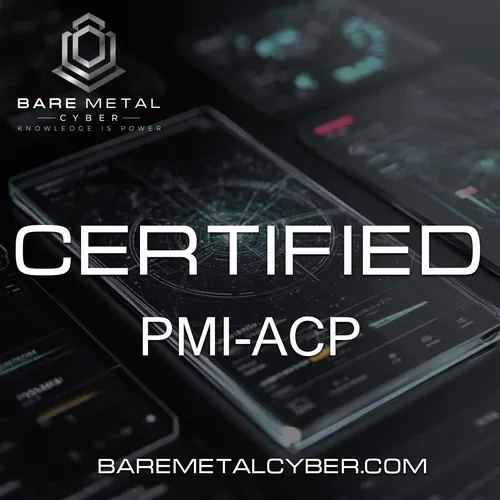
Certified - PMI-ACP Audio Course
The PMI-ACP Audio Course is a complete audio-first training series designed to help you master agile principles, practices, and exam readiness for the PMI Agile Certified Practitioner credential. Across 99 structured episodes, the course covers mindset, leadership, product delivery, metrics, risk management, and continuous improvement—all explained in clear, scenario-focused language that prepares you for the exam. Whether you’re commuting, exercising, or studying at your desk, each episode builds your knowledge step by step while reinforcing agile fluency. Produced by BareMetalCyber.com, this PrepCast makes agile learning flexible, practical, and effective.
- Update frequency
- every day
- Average duration
- 31 minutes
- Episodes
- 99
- Years Active
- 2025

Episode 59 — Domain 3 Product: Overview
This episode introduces the third PMI-ACP domain, Product, which focuses on ensuring teams deliver maximum value through well-managed backlogs, clear priorities, and strong stakeholder alignment. The…

Episode 58 — Collaborative Resolution: Facilitating Win-Win Outcomes
This session explores resolution techniques that prioritize collaboration and mutual benefit. Learners are introduced to facilitation methods that guide conflicting parties toward shared solutions ra…

Episode 57 — Conflict Assessment: Identifying Root Cause and Level
This episode introduces structured approaches to assessing conflict within agile teams. Candidates learn to identify root causes—such as resource constraints, personality clashes, or unclear goals—an…

Episode 56 — Communication Rhythm: Broadcasting Vision and Purpose Continuously
This session reviews the role of communication rhythm in sustaining vision and strategy alignment. Learners explore how cadence-based updates—such as sprint reviews, town halls, and stakeholder syncs…

Episode 55 — Strategy Alignment: Keeping Product Tied to Organizational Goals
This episode builds on vision alignment by focusing on strategy. Learners discover how agile teams ensure that product goals are consistently tied to broader organizational strategies. The session hi…

Episode 54 — Vision Alignment: Building Common Purpose with Stakeholders
This episode explains how aligning teams and stakeholders around a shared vision ensures energy and effort are directed toward meaningful goals. Learners explore techniques for crafting and communica…

Episode 53 — Recognition: Celebrating Visible Agile Behaviors
This session reviews the importance of recognition in reinforcing agile values. Learners discover how recognizing visible behaviors—such as collaboration, adaptability, and openness—encourages repeti…

Episode 52 — Continuous Improvement: Creating a Learning Environment
This episode explores how continuous improvement is embedded in agile culture, making learning an ongoing process rather than a periodic activity. Candidates learn how practices like retrospectives, …

Episode 51 — Awareness: Socializing Agile Values and Principles
This episode emphasizes how building awareness of agile values and principles creates alignment across teams and stakeholders. Learners explore techniques for socializing concepts such as customer co…

Episode 50 — Time Allocation: Scheduling Knowledge Sharing and Updates
This session explains how agile teams allocate time deliberately for knowledge sharing and continuous learning. Candidates learn how to embed practices such as lunch-and-learns, backlog review sessio…

Episode 49 — Knowledge Reuse: Leveraging Organizational Assets and People
This episode builds on knowledge capture by focusing on reuse. Candidates learn how to apply documented lessons, tools, templates, and expertise across projects and teams. The discussion emphasizes t…

Episode 48 — Knowledge Capture: Lessons Learned, Retrospectives, Communities of Practice
This session explores how agile teams capture and share knowledge to avoid repeating mistakes and to leverage insights. Learners are introduced to practices such as lessons learned sessions, retrospe…

Episode 47 — Timely Closure: Ensuring Problems Are Resolved Quickly
This episode highlights why timely closure of issues is critical in agile practice. Unresolved problems accumulate as technical debt, reduce trust, and slow delivery. Candidates learn how agile teams…

Episode 46 — Resolution Strategies: Selecting Options That Maximize Value
This session focuses on resolution strategies for conflicts, impediments, or risks within agile environments. Learners explore methods ranging from negotiation and consensus-building to escalation an…

Episode 45 — Root Cause Analysis: Five Whys, Ishikawa, and Beyond
This episode explains how agile teams use root cause analysis (RCA) to address problems systematically. Candidates are introduced to tools such as the Five Whys technique and the Ishikawa (fishbone) …

Episode 44 — Team Self-Assessment: Interpreting Results to Grow Capability
This episode introduces the practice of team self-assessment as a tool for continuous improvement. Learners are guided through frameworks such as agile maturity models, health checks, and self-rating…

Episode 43 — Non-Verbal Cues: Reading the Room in Team Interactions
This session explores the importance of non-verbal communication in agile teamwork. Candidates learn to recognize cues such as body language, tone, facial expressions, and silence, which often reveal…

Episode 42 — Emotional Intelligence: Empathy, Influence, and Conflict Support
This episode highlights the role of emotional intelligence (EI) as a cornerstone of agile leadership. Learners explore how self-awareness, self-regulation, empathy, and social skills influence team c…

Episode 41 — Enablement: When to Train vs Coach vs Mentor
This episode explores the concept of enablement in agile leadership, focusing on how leaders decide when to train, coach, or mentor their teams. Training provides structured knowledge transfer, coach…

Episode 40 — Collective Ownership: Sharing Goals and Outcomes
This session emphasizes how agile teams succeed when responsibility is shared collectively rather than fragmented by role or hierarchy. Learners discover how collective ownership creates alignment, r…